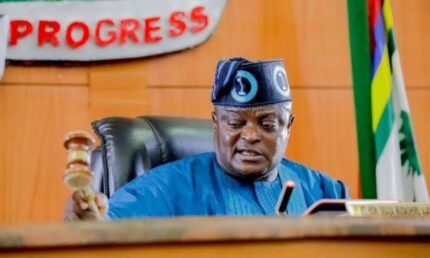Mudashiru Obasa’s tenure as Speaker of the Lagos State House of Assembly, spanning nearly a decade, came to an abrupt end on Monday, following his impeachment over multiple allegations of fraud. His downfall was not just the result of alleged financial improprieties but a culmination of intrigues, hubris, and intense political maneuvering.
The former speaker was accused of overseeing the withdrawal of N43.5 billion for backup vehicles for lawmakers, alongside other financial infractions. Mudashiru Obasa’s absence from Nigeria—he was reportedly in Atlanta, USA—when lawmakers initiated impeachment proceedings further weakened his position. In a swift move, the Assembly elected Mojisola Meranda as the first female Speaker and Fatai Mojeed as the Deputy Speaker. Abiodun Tobun, a member representing Epe Constituency 1, emphasized that the decision to remove Obasa was unanimous and necessary to restore the integrity of the House.
“This House cannot afford to fall into ruin,” Tobun remarked. “The leadership change was essential to uphold our duty to Lagos State and our constituencies.”
A Reign Marred by Allegations
Mudashiru Obasa’s nine-year tenure was riddled with allegations of financial mismanagement and impropriety. In 2020, he faced scrutiny from the Economic and Financial Crimes Commission (EFCC) over accusations of diverting Lagos State funds into personal accounts. The most recent controversy centered around claims that the Assembly spent N17 billion constructing a gate—a claim Obasa dismissed as politically motivated.
Mudashiru Obasa defended his administration’s financial decisions, asserting, “It is funny. How much is the Assembly’s allocation in a year for anyone to claim we spent N17 billion on a gate? These allegations are baseless, arising only because the 2027 elections are approaching.” Despite his defense, political observers note that Obasa’s confrontational style and alleged missteps alienated key allies, sealing his fate.
Clash with Powerbrokers and the Role of Tinubu
Mudashiru Obasa’s impeachment is tied to his strained relationship with Lagos State’s political elite, including Governor Babajide Sanwo-Olu and members of the Governor’s Advisory Council (GAC). During President Bola Tinubu’s festive season visit to Lagos, GAC members reportedly presented grievances against Obasa, accusing him of disrespecting the governor and mismanaging state politics.
Sources revealed that Tinubu, regarded as Lagos’ political godfather, was displeased with Mudashiru Obasa’s conduct. Allegations against the Speaker included pushing a controversial bill that would enable the Assembly to sack the Chairman of the Lagos State Independent Electoral Commission. Tinubu allegedly dismissed the idea as “a joke” and admonished Obasa for his arrogance.
The former Speaker’s attempt to personally pacify Tinubu reportedly backfired, as GAC members joined the private meeting, further eroding his standing. Fouad Oki, an APC chieftain, summarized the situation: “Obasa began to see himself as an emperor. His impeachment was necessary to check his excesses and preserve Lagos’ political stability.”
The Shadow of 2027 and Speculative Intrigues
Mudashiru Obasa’s downfall has been linked to speculations about his gubernatorial ambitions for the 2027 elections. Political analysts suggest he was poised to contest for the APC ticket against heavyweights like Seyi Tinubu, former Governor Akinwunmi Ambode, and Senator Tokunbo Abiru. Obasa’s perceived ambition allegedly ruffled feathers among Lagos powerbrokers, with many viewing him as a threat to their preferred candidates.
While Mudashiru Obasa denied actively pursuing the governorship, his remarks during the 2025 budget presentation, where he hinted at his capability to lead Lagos, were seen as overstepping boundaries. Former Lagos Speaker Adeyemi Ikuforiji dismissed claims that Obasa’s ambition caused his impeachment but acknowledged the influence of larger political interests.
In the aftermath, observers see Obasa’s impeachment as a strategic move to consolidate power ahead of the 2027 elections, ensuring the continued dominance of Tinubu’s political dynasty. As Lagos politics unfolds, the fall of Mudashiru Obasa serves as a stark reminder of the intricate interplay of power, loyalty, and ambition in Nigeria’s political landscape.
Table of Contents
Discover more from OGM News NG
Subscribe to get the latest posts sent to your email.














